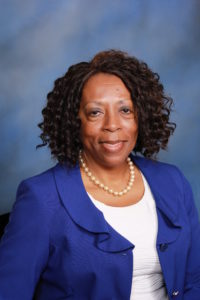
Volunteer of the Month – December 2017
Firm: Cannon Law Group PLLC
1. How did you first get involved in pro bono?
My pro bono work is a result of the culmination of volunteerism in college – working with PACE (People Active in Community Efforts) and ZØB (Zeta Phi Beta Sorority, Inc., a service-based sorority), and participation in three legal clinics at a public interest law school. Once licensed as an attorney in 1984, I made a goal to set aside at least 5 hours per month rendering pro bono legal services. When I relocated to Texas in 2001, I made my way over to the DVAP office to stay connected to the legal community and help those in need.
2. What types of cases have you accepted?
While I have accepted family law cases, my contributions are maximized through my involvement in the legal intake clinics. I am best at screening cases and completing intake. I capture the facts down in a clear and concise format, identify the legal issues, and make recommendations for resolution. I screen cases in family law, Veteran’s benefits, social security, bankruptcy, child support, and custody matters. I have practiced in these areas and gained great knowledge and wisdom over the years. The intake process is essential in aiding the attorney willing to accept the matter pro bono.
3. Which clinics have you assisted with?
Over the past five years, I have been a consistent volunteer attorney at DVAP’s Veterans Legal Clinic, which is held on the first Friday of the month at the Veterans Resource Center. This clinic has a high volume of veterans seeking legal counsel. I also participated in the legal clinic held at the Potter’s House Church.
4. Describe your most compelling pro bono case.
My most compelling pro bono case is still pending. I represent a 91-year-old WWII Veteran who was denied compensation for a service-connected injury he sustained in 1945. His claims for benefits relate to surgery the VA denies as occurring since medical records did not clearly state that he underwent surgery. I had him examined by an otolaryngologist (for chronic sinusitis and rhinitis) who confirmed the surgery through nasal endoscopy. He was also seen by an ophthalmologist who confirmed that his eye injury (strabismus) is connected to the surgery. It is possible that we can get him back benefits from the date that he filed his Claim in 1945. I pray that he will still be here to realize the relief he sought for nearly 72 years ago.
5. Why do you do pro bono?
I do it because I believe in giving back and paying it forward. The Bible says that it is more blessed to give than to receive, and I wholeheartedly ascribe to this principle. I become better equipped as a counselor since we must be compassionate enough to listen to the client’s concerns and adept at quickly assessing the matter to propose a viable solution.
I am humbled to serve those who have laid their lives down for us. They deserve our respect and our best legal representation. I treat the persons who come to our Veterans Clinic the same as I do paying clients. I suit up and bring a listening ear and a learned heart to help assess their legal concerns and to give the next attorney an intake memo with an action plan.
6. What impact has pro bono service had on your career?
Pro bono services has helped me sharpen my time-management skills (since I know that I want to serve, I must purposefully approach work/life balance). I have met many attorneys and paralegals who also render pro bono services and count these relationships and teamwork as positively impacting my career and fueling my passion to continue the practice of law.
7. What is the most unexpected benefit you have received from doing pro bono?
I was introduced to a new practice area, Veterans Benefits, by attending a DVAP-sponsored CLE which prompted me to go the extra mile to serve the needs of the veterans who attend the Veterans Clinic.

